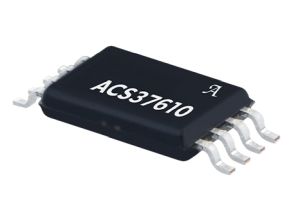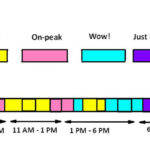A new coreless Hall-effect current sensor for demanding automotive and industrial systems offers higher accuracy and sensitivity, additional fault detection capabilities, and user programmability. Allegro’s new ACS37610 sensor joins the ACS37612 as the industry’s first family of truly coreless Hall sensing solutions designed to measure currents from 100 A to greater than 4,000 A flowing through a busbar or PCB trace with a typical 1% accuracy – with no need for an external concentrator or U-shaped magnetic shield. These innovative solutions enable system designers to achieve enhanced efficiency and higher power density while reducing system complexity, BOM, cost, footprint, and weight.
“As a leading innovator in current sensing solutions for more than 20 years, Allegro was first to market with  coreless differential Hall-effect current sensing technology, and our new ACS37610 IC enables our customers to accurately measure hundreds or thousands of amps in a very economical and simple way,” said Shaun Milano, Director of Current Sensors at Allegro. “Our differential Hall-based sensors provide excellent immunity to stray magnetic fields without the need of a shield, required by competing solutions, that slows down response and adds non-linearity error into the system.”
coreless differential Hall-effect current sensing technology, and our new ACS37610 IC enables our customers to accurately measure hundreds or thousands of amps in a very economical and simple way,” said Shaun Milano, Director of Current Sensors at Allegro. “Our differential Hall-based sensors provide excellent immunity to stray magnetic fields without the need of a shield, required by competing solutions, that slows down response and adds non-linearity error into the system.”
The ACS37610 is for electric vehicle high-voltage traction motor inverters, 48/12-V auxiliary inverters, heterogeneous redundant battery monitoring, overcurrent detection, smart fuses, power distribution units (PDUs), and power supplies. The sensor’s 250-kHz bandwidth, dedicated overcurrent and overtemperature fault pin, and a slew of built-in diagnostics make it ideal for safety-critical applications.
The ACS37610 features advanced differential sensing technology, resulting in a 2.5× improvement in signal-to-noise ratio (SNR) and a 2× lower noise relative to the ACS37612. The lower noise provides superior resolution required for accurate torque control, while the sensor’s 4× higher sensitivity range enables flexible busbar and PCB designs.
While not mandatory, a slight notch to the current-carrying busbar or PCB copper trace provides further improvements to the system’s SNR. The ACS37610 features larger Hall element spacing (2.5 versus 1.8 mm for the ACS37612) to accommodate wider notches, resulting in virtually no thermal performance degradation and no hotspots. The sensor can be mounted in a horizontal or vertical orientation relative to the busbar, providing superior flexibility in mechanical assemblies.
The ACS37610 current sensor is available now in a low-profile, lead (Pb)-free, eight-pin surface mount TSSOP package. The sensor’s ultra-compact package makes it a candidate for space-constrained applications while enabling simple, cost-effective surface mount assembly. To help developers accelerate their designs, Allegro offers evaluation kits and reference tools for current flowing through a PCB or busbar.
Allegro MicroSystems, 955 Perimeter Road, Manchester, NH 03103, allegromicro.com/coreless







Leave a Reply